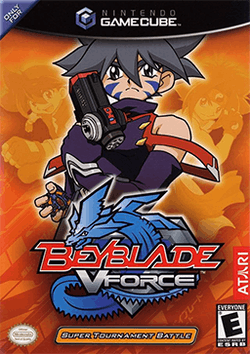Beyblade: Super Tournament Battle
| Beyblade: Super Tournament Battle | |
|---|---|
 North American cover art featuring Kai | |
| Developer(s) | A.I[1] |
| Publisher(s) |
Atari Takara Nelvana |
| Platform(s) | Nintendo GameCube |
| Release date(s) |
‹See Tfd› ‹See Tfd› |
| Genre(s) | Role-playing, action |
| Mode(s) | Single-player |
Beyblade: Super Tournament Battle, also known as Beyblade VForce: Super Tournament Battle and Bakuten Shoot Beyblade 2002: Nettou! Magne-tag Battle! (爆転シュートベイブレード2002 熱闘!マグネタッグバトル!)[2] in Japan is a 2002 role-playing video game.
Gameplay
In the game, the player selects a Beyblade and a Beyblader to fight in a tournament, buying better Beyblades as the game progresses. The objective of the game is to knock your opponent out of the stadium. When launching a Beyblade, a "Launch Meter" is displayed and quickly fills itself up with a golden meter. The closer the golden meter is to its end when the player hits the launch button, the faster the Beyblade will revolve. Players can also get points if the player makes the Beyblade stop spinning or misses a launch.
The player earns four points or more if they destroy the opponent's Beyblade to pieces using a powerful assault from the Bit-Beast. In order to be capable of releasing a Bit-Beast, the player has to earn "Legend Power" points simply by hitting other Beyblades repeatedly. Bit-Beast assaults usually take a larger amount of energy from the adversary than normal assaults and they also increase the speed of the spins.
Development
Beyblade is an action role-playing game for Nintendo GameCube. It was based on the anime and manga Beyblade and was released originally on December 19, 2002 in Japan and was later released in the west in 2003.
Reception
| Reception | ||||||||||||||
|---|---|---|---|---|---|---|---|---|---|---|---|---|---|---|
| ||||||||||||||
The game was not well received by game reviews. IGN ranked it 2.5 out of 10, stating that "the concept couldn't be simpler and this is largely why there's no need to do it in videogame form, especially if the videogame is as poorly conceived as this".
References
- ↑ "A.I softography (look for ベイブレード 激闘マグネタッグバトル)". Retrieved 10 November 2012.
- ↑ "Japanese Nintendo GameCube Softography for 2002". Retrieved 10 November 2012.
- ↑ "Aggregate score at Game Rankings".
- ↑ "Aggreate score at Metacritic".
- ↑ "Review at IGN".